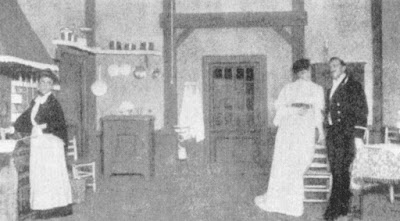August Strindberg - 1849-1912
The author of 60 plays, 12+ novels, 100+ short stories, as
well as various other writings, Strindberg is considered the ‘father of Swedish
literature’. Strindberg had a complicated personality and mindset, and he once
noted that his was a childhood affected by ‘emotional insecurity, poverty,
religious fanaticism and neglect’. Over his life he suffered from persistent
paranoia, three broken marriages, and a major nervous breakdown – all in the
midst of extraordinary creative output.
Strindberg’s plays are generally divided into two periods:
his ‘Naturalistic’ or (‘slice of life’) plays, from 1872 - 1894 (including Miss Julie in 1888) and ‘Expressionist’ plays
from 1897 on. The transitional three years between were a time of intense
interest in and focus on the occult, and are more than likely to have
influenced his exploration of dream/nightmare elements, symbolic actions and a
subjective interpretation of the world in his later works. However, Strindberg
was always interested in a more impressionistic interpretation of Naturalism,
and his earlier plays were less photographic in their realism when compared to
other authors of the time (particularly Emile Zola).
‘He saw characters operating out of “a whole series of deeply
buried motives.” His characters were not necessarily the product of their genes
or their social circumstances… Yet he saw clearly that class distinctions
helped determine the behavior of many people. Strindberg seemed to accept the
view that people were not created by their class but rather belonged to their
class because of the kind of people they were. Strindberg probed deeply into
the psychology of his characters, whose emotional lives, rather than outward
social qualities, determined their actions.’
Bedford, p.654
In regards to women, August Strindberg was apparently as complex
and contradictory in his attitudes as in most other aspects of his life. He was
described as a misogynist, but married a successful actress who performed much
of his work including the title character in Miss Julie. He indicated that he saw women as representing both the
best and the most ‘evil’ the world had to offer, a perspective that could
potentially be represented by Miss Julie’s contempt for herself as a woman
along with her contempt for men. In his preface to the play, Strindberg described
Miss Julie as a ‘modern character’, a ‘half-woman’ who sells herself for power,
honors, and recognition rather than money. He calls her ‘tragic’ because her
modernity struggles against Nature; he believed that romantic natures seek for
happiness, but cannot achieve it because it belongs only to the strong and
skillful (Nature = survival of the fittest). He calls her a victim of: ‘her own
flawed constitution’, the family problems caused by ‘a mother’s “crime”’, and ‘the
delusions and conditions of her age’ (it is unclear if ‘age’ refers to actual
number of years, or to the era/manners/social expectations in which she lives.
Possibly both.)
There is a dreamlike quality that creeps into the play
(evoking A Midsummer Night’s Dream, perhaps), a psychological approach that marks
the work as an early representation of his later expressionistic style. Themes
include a focus on opposites, directions, movement: ‘social climbing or
falling, of higher or lower, better or worse, man or woman’. In regards to
social climbing vs. aristocratic status, Strindberg wrote that the dilemma of
the ‘slave’ is his vacillating ‘sympathy for people in high social positions
and hatred for those who currently occupy those positions.’ Jean’s only polish
is surface, his common nature is indicated by his unconcern with the notion of ‘honor’,
and the play suggests, by referencing Jean’s plans for his future children,
that social climbing is genetic. This contrasts sharply with the notion of
inherent nobility, and the behaviors that this inbred trait brings out in its
descendants. The playwright also says Jean is superior to Miss Julie because he is a
man; that he is a sexual aristocrat because of his ‘masculine strength, his
more keenly developed senses, and his capacity for taking the initiative.’
(From a modern perspective, these assertions are definitely points for debate.)
 |
| Miss Julie, Stockholm, 1906 |
* * *
- Is Death directional (a moving on, letting
go?), or does Julie die in order to redeem her honor and cement an aristocratic
presence/memory (i.e., retard all movement)?
- Is Jean
inherently a social climber or a misplaced aristocrat, as determined by his
nature, education, and behavior?
- Based on the
play, what are Strindberg’s perceptions of women? Are they true to the period,
less extreme, or more? How does this match up with perceptions of women today?
- What do you think
about the play’s almost religious perception of ‘social circumstance’ (Miss
Julie – devotee, Jean – agnostic, Kristine – blind follower?)? Is there a
modern-day equivalent?
Source: The Bedford Introduction to Drama – pp. 653-6, 673- 676



















